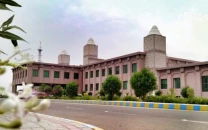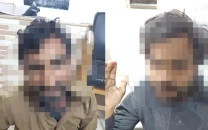Go ahead and fail me, but I have to go help the flood survivors
A group of five students from the Indus Valley School of Art and Architecture decided to help in relief efforts.

“If you want to fail me, go ahead,” commented one of them, who had decided that his education would be incomplete anyway if he did not go.
It was no ordinary trip. Despite disapproving looks, these boys and one teacher, decided that nothing was bigger than doing their bit for the flood survivors in upper Sindh.
They packed into two cars and left Karachi last Thursday. Their destination was Shikarpur, where a container they had sent separately, was to arrive the next day. The plan of action was to chase the container, deliver the goods properly and return to Karachi. But as with all plans, it looked great on paper and in their heads. What they were not prepared for was the emotional ride.
“I belong to Sukkur,” said one of the students. (None of them want to be named). “Looking at these people and what they are going though makes me wonder even now, when I feel like we did something, that there is still a lot to be done.”
The boys reached Qazi Ahmed, an hour away from Karachi, in time for iftar on Thursday. Sustenance and an hour’s break from driving was all that the gang needed to keep going. Their next stop was Sukkur, where a bed and breakfast awaited.
For another student, a live visual of the Sukkur Barrage, swelling with water and spilling torrents, was an overwhelming picture. Looking at it, he says that he remembers fear, the kind that is likely to make you feel helpless and vulnerable as you realise what the magnitude of such a force truly is.
The next morning, it was all action. The students headed towards Shikarpur and reached the district before their container. After a couple of hours, the container arrived and the boys, with the help of a benefactor who offered them his warehouse, started unloading.
The process of distributing the relief was a somewhat tricky one. The boys, who were initially looking for camps that, in fact, did not exist, realised that the best way to go about distributing was to do just that, distribute.
That in itself, however, was not easy. The work was often interrupted by riots over food and fights among the people who did not have enough to eat. “We hired Suzukis in Shikarpur. The kind that are closed all around, but open from the back. Whenever we stopped, someone would get inside,” said one student, who added that a lot of people injured themselves in the process. To them, it did not matter, as long as they could get some food in the process.
“We tried to give the food to the women. In Sindh, the lady of the house is more active,” said one student. “She runs the house and is even involved in construction and repair work, so it seemed only right to give things to women. But the men would grab at them and the children would get in the way.”
The boys even tried to make their way to Jacobabad to distribute food. But they realised that people were leaving the city, and that the areas around it resembled ghost towns. They decided instead to give away food to people on the roads, in tractors or in shantytowns.
The boys remained in Shikarpur for two days, during which time they also decided to visit Rahimabad. It was here that they saw the most destruction - dead animals, knee-deep water and desolation. In the middle of it all floated a haveli - half drowned and eerily empty - that belonged to the family of Hamir Soomro, an IVSAA faculty member.
The journey back was set for Sunday. They left in the afternoon, and reached Karachi towards midnight after another stopover at Qazi Ahmed.
For them, the journey was everything. It was an eye-opener. They appreciated the way people had jumped to help. Some had gone so far as to donate Oreos and bottled water from Dubai that cost Rs400 a bottle.
These students are now in the process of setting up a weekly run. They want to send a consignment of supplies every weekend. Money is the best way to help, and that if people trust what they are doing, they should offer financial assistance, instead of supplies.
“When we buy in bulk, we are getting more for less money. We don’t need Basmati, we need cheaper rice. These people are dying of hunger. Top quality is not the concern here.”
Published in The Express Tribune, August 21st, 2010.

















COMMENTS
Comments are moderated and generally will be posted if they are on-topic and not abusive.
For more information, please see our Comments FAQ